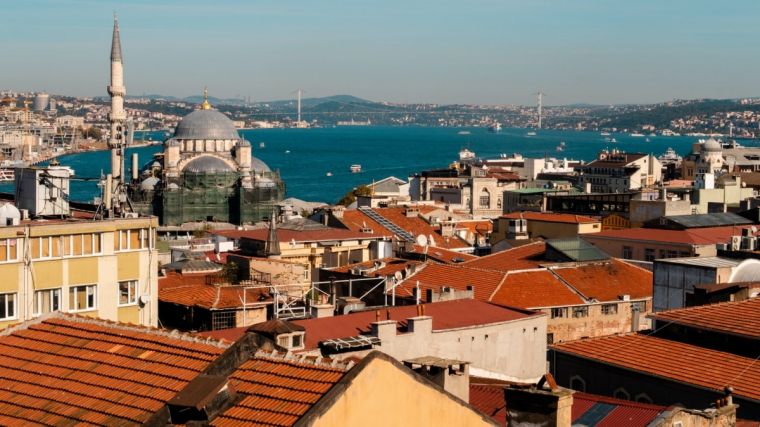Turkey plans to open its first-ever newly-built church in Istanbul

(CP) The construction of the Mor Efrem Syriac Ancient Orthodox Church, the first-ever church built in the modern Republic of Turkey, is nearly complete and is expected to open within two months, the Istanbul Syriac Ancient Foundation has announced.
The church's foundation was laid in February 2019 during a ceremony attended by President Recep Tayyip Erdogan in Istanbul's Yesilkoy district.
"Feverish work is being carried out to eliminate the last deficiencies to open the first-ever church of the Turkish republic," Daily Sabah quoted Sait Susin, the Foundation's president, as saying.
The first floor will host the cultural hall for the congregation to gather and hold ceremonies such as baptisms, condolences and weddings, as well as other meetings and conferences, Susin explained. The ground floor will be for prayers and rituals, and will have a bishop's living area, guest rooms and a parking lot, he added.
Susin told Turkey's Anadolu Agency that the church cost about $4 million.
He further explained that while there are churches from the Turkish Republic era, Mor Efrem Syriac Ancient Orthodox Church is the first church to be built from scratch in modern Turkey. "They were built without official permission. It is the first time that a church has been officially built. This gives us great pride," he said.
There was a need for a church in the Yesilkoy, Bakirkoy and Florya districts of Istanbul, where the Assyrian community is densely populated, Susin further said.
Anadolu Agency previously reported that when completed, the church would serve about 17,000 Syriac Orthodox believers living in Istanbul.
It suggested that the increase of the Syriac Christian minority in Turkey due to the Syrian civil war was one of the main reasons for Turkey agreeing to build a new church. Turkish authorities had previously set up a refugee camp reserved for Syriac Christians, hosting up to 4,000 people.
Plans for the new church were first revealed in 2015, when Agence France Presse noted that the church would be the first one built since the end of the Ottoman Empire and the establishment of the modern republic in 1923.
However, Christians have had strong religious freedom concerns during the administration of President Erdogan. Back in 2016, the government seized the last six remaining Christian churches in the war-torn southeastern city of Diyarbakir, declaring them state property.
The decision caused outrage among the Armenian, Syriac and Chaldean communities and a number of church foundations, which threatened legal action.
Last October, a Syriac monastery in southern Turkey reopened its doors to believers about 100 years after it was seized by the Turkish army and transformed into a military hospital before becoming a prison and warehouse.
The Turkish army seized the monastery during World War I. The building was briefly returned to the Christian community after the war ended. But a few years later, the monastery was turned into a military hospital. It eventually became a prison and was later converted into a warehouse.
Many Syriac Christians still speak Neo-Aramaic, a language that descended from the language spoken by Jesus. Christians have been living in southern Turkey since the first centuries of Christianity.
Estimates suggest that hundreds of thousands of Armenians, Greeks and other Christians were killed by Turkish authorities during World War I. Today, Syriac Christians comprise a tiny fraction of Turkey's population.
In 2020, President Erdogan converted Istanbul's landmark and church-turned-museum, the Hagia Sophia, into a mosque. He also ordered another ancient Orthodox church, the Church of the Holy Saviour in Chora — also known as the Kariye Museum — to be turned into a mosque.
Istanbul's Hagia Sophia, built in 537 A.D. as a Greek Orthodox church, was the seat of Eastern Christianity for 900 years before the city was seized in the 15th century by Sultan Mehmed II, who converted it into an Ottoman mosque. In 1934, modern Turkey's founder, Mustafa Kemal Ataturk, banned worship in Hagia Sophia and designated it as a museum.
Originally built in the early fourth century by Constantine the Great, the Holy Saviour church was converted into the Kariye Mosque about 50 years after the 1453 conquest of Constantinople by the Ottoman Turks. In 1945, the building was designated a museum by the Turkish government. The museum was opened for public display in 1958 after American art historians helped restore the original church's mosaics.
Many believe Erdogan made the decision to turn the Hagai Sophia into a mosque as an attempt to gain support among his conservative base at a time when the opposition party had called for early elections.
© The Christian Post











